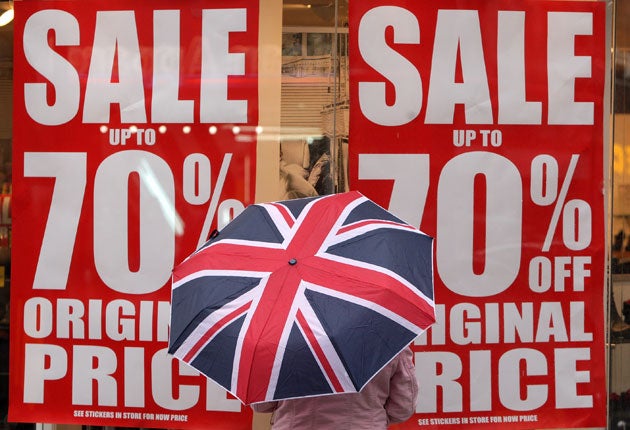First negative inflation figure since 1960

The UK experienced its first period of deflation in almost 50 years in March, official figures revealed today.
Data from the Office for National Statistics (ONS) showed the Retail Prices Index (RPI) measure of inflation fell to minus 0.4 per cent last month, down from 0 per cent in February, the first negative reading since March 1960.
The official Consumer Prices Index (CPI) measure also fell, from 3.2 per cent in February to 2.9 per cent.
Today's inflation figures were broadly in line with expectations and will reignite fears of a period of deflation for the UK as the effects of recession take hold of the economy.
While CPI remains above the Government's two per cent target, negative RPI could have unwanted consequences for many households because it is used as a benchmark for private sector wage settlements.
It is also used as the basis for annual rises in State pension payments and other benefits, as well as annuity payments for private pensions and rates for index-linked savings.
RPI was pushed lower than the official measure because, unlike CPI, it includes housing costs and mortgage payments.
Its fall was attributed to the effects of deep interest rate cuts, which filtered through to lower mortgage payments, and plummeting house prices.
Last month's fall reflects February's cut in the cost of borrowing to 1 per cent.
The Bank of England has since slashed interest rates further, to a record low of 0.5 per cent.
The ONS said the largest downward pressure on CPI was a drop in household gas bills.
Food and non-alcoholic beverage costs were also lower, as fruit, vegetables and bread prices all fell compared with a year ago.
Transport costs also played a part in pulling inflation down, mainly because of lower air fares on European routes compared with last March. The ONS said this was because the Easter school holidays, which tend to attract higher flight prices, fell in March last year, but April this year.
Fuel also rose more slowly than a year ago, when it had just begun to climb to the peaks experienced last summer.
Jonathan Loynes, chief European economist at Capital Economics, said the figures suggested that retailers were pushing prices back up to widen their margins.
He added: "This has certainly caused inflation to fall more slowly than we had anticipated, but there are good reasons not to get too worried.
"For a start, energy prices should fall a fair bit further over the coming months as already announced cuts in gas and electricity prices feed through.
"And second, we suspect that the weakness of retail spending and activity in general will bear down strongly on core inflation in time."
Howard Archer, of IHS Global Insight, said CPI had been prevented from falling faster as the weakness in the pound caused retailers to raise prices to offset higher import costs.
He said this meant the official inflation measure was unlikely to turn sharply negative this year, although "a brief period of mild deflation is still possible".
But Mr Archer said the decline in RPI would "deepen significantly".
"Given that many pay awards are still linked to retail price inflation, the decline in March will maintain the downward pressure on wages already coming from soaring unemployment and companies' deteriorating profitability," he said.
"As a result, many workers are likely to see wage freezes or even pay cuts."
David Kern, chief economist at the British Chambers of Commerce (BCC), said: "Deflationary pressures could make the recession worse in the short term, despite quantitative easing and the huge budget deficit posing inflationary pressures over the medium term.
"The Chancellor must address both these conflicting risks in his Budget. He must support business and administer targeted fiscal stimulus for the year ahead.
"But he also has to present a credible medium-term plan for restoring the public finances back to health."
Join our commenting forum
Join thought-provoking conversations, follow other Independent readers and see their replies
Comments
Bookmark popover
Removed from bookmarks